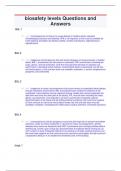biosafety levels Questions and
Answers
BSL 1
✓ ~~~ microorganisms not known to cause disease in healthy adults; standard
microbiological practices are followed, PPE is not required, a sink must be available for
hand washing; examples are bacillus subtilis, serratia marcescens, staphylococcus
saprophyticus
BSL 2
✓ ~~~ indigenous microorganisms that can lead to diseases of varying severity in healthy
adults; BSL 1 procedures plus lab access is restricted, PPE must be worn including lab
coats, gloves, and eye protection, work that may generate aerosols or splashes are
performed in a biological safety cabinet, contaminated waste is autoclaved, the lab has
self closing doors, a sink and eye wash are available; examples: s. aureus, streptococcus
pyogenes, and salmonella
BSL 3
✓ ~~~ indigenous or exotic microorganisms that cause serious or potentially lethal disease
through respiratory transmission; BSL 2 procedures plus medical surveillance of lab
employees, immunizations may be required; locking, double door access separates the
labs work area from the other part of the facility, PPL must be worn including lab coats,
gloves, eye protection, and respirators; all work is performed in biosafety cabinet,
decontamination of all waste and lab clothing before laundering; lab must have negative
air flow, exhaust air cannot be recirculated; hands free sink and eye wash must be
available; examples: mycobacterium tuberculosis, bacillus anthracis, francisella tularensis
BSL 4
✓ ~~~ microorganisms that are dangerous and exotic with high risk of aerosol transmitted
infections; rarely are there treatments or vaccines for these microorganisms, and the
diseases they cause are frequently fatal; BSL 3 procedures plus changing clothes before
entering lab, shower upon exiting lab, decontaminate all materials before exiting lab, all
work is done in class 3 biosafety cabinet or by wearing a full body, positive pressure suit,
lab must have negative air flow, and exhaust air cannot be recirculated, the lab must be in
a separate building or in an isolated and restricted zone of the building
fungi, 1
, ✓ ~~~ morphology & biosafety level of aspergillus
positive rod, 1
✓ ~~~ gram stain, morphology & biosafety level of bacillus cereus
positive rod, 1
✓ ~~~ gram stain, morphology & biosafety level of bacillus megaterium
positive rod, 1
✓ ~~~ gram stain, morphology & biosafety level of bacillus subtilis
negative rod, 1
✓ ~~~ gram stain, morphology & biosafety level of citrobacter freundii
postive rod, 1
✓ ~~~ gram stain, morphology & biosafety level of clostridium beijerinckii
positive rod, 1
✓ ~~~ gram stain, morphology & biosafety level of clostridium sporogenes
negative rod, 2
✓ ~~~ gram stain, morphology & biosafety level of enterobacter aerogenes
positive cocci, in short chains, 2
✓ ~~~ gram stain, morphology & biosafety level of enterococcus faecalis




